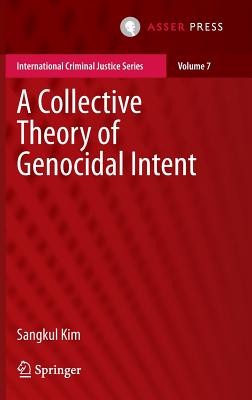
- Išsiųsime per 10–14 d.d.
- Autorius: Sangkul Kim
- Leidėjas: T.M.C. Asser Press
- Metai: 2016
- Puslapiai: 235
- ISBN-10: 9462651221
- ISBN-13: 9789462651227
- Formatas: 15.6 x 23.4 x 1.6 cm, kieti viršeliai
- Kalba: Anglų
- Extra -15 % nuolaida šiai knygai su kodu: ENG15
Atsiliepimai
Aprašymas
Tackling one of the most confusing and controversial issues in the field of international criminal law -- i.e., the genocidal intent element, this monograph seeks to develop an account of genocidal intent from a collectivist perspective. Drawing upon the two-layered structure of the crime of genocide composed of the 'conduct level' and 'context level', it detects the genocidal intent element at the 'context level'. The genocidal intent found in this manner belongs to a collective, which significantly departs from the prior individualistic understandings of the notion of genocidal intent. The author argues that the crime of genocide is not a 'crime of mens rea'. Collective genocidal intent at the 'context level' operates in a way that renders the crime of genocide itself a criminal enterprise. The idea of genocide as a criminal enterprise also suggests that genocide is a leadership crime in respect of which only the high-level actors can be labeled as principals (as opposed to accessories).The book criticizes the dominant individualistic approaches to genocidal intent (in particular: the knowledge-based approach) which have thus far governed the relevant jurisprudential and academic analysis. It further demonstrates that the hidden notion of 'collective genocide' silently governs the relevant international jurisprudence. Practitioners and academics in the field of international criminal law and related disciplines will find in this book a new approach to the crime of genocide. The text is the first-ever book-length exposition of a collective account of genocidal intent. Its accessibility is highly enhanced by relevant footnotes.Sangkul Kim is Lecturer at Korea University in Seoul and Research Fellow with the Centre for International Law Research and Policy (CILRAP).He served as Associate Legal Adviser at the Office of the Prosecutor of the International Criminal Court (2004-2008). He earned law degrees from Korea University and Georgetown University Law Center.
EXTRA 15 % nuolaida
Kupono kodas: ENG15
Akcija baigiasi už 2d.10:37:54
Nuolaidos kodas galioja perkant nuo 10 €. Nuolaidos nesumuojamos.

- Autorius: Sangkul Kim
- Leidėjas: T.M.C. Asser Press
- Metai: 2016
- Puslapiai: 235
- ISBN-10: 9462651221
- ISBN-13: 9789462651227
- Formatas: 15.6 x 23.4 x 1.6 cm, kieti viršeliai
- Kalba: Anglų
The book criticizes the dominant individualistic approaches to genocidal intent (in particular: the knowledge-based approach) which have thus far governed the relevant jurisprudential and academic analysis. It further demonstrates that the hidden notion of 'collective genocide' silently governs the relevant international jurisprudence. Practitioners and academics in the field of international criminal law and related disciplines will find in this book a new approach to the crime of genocide. The text is the first-ever book-length exposition of a collective account of genocidal intent. Its accessibility is highly enhanced by relevant footnotes.Sangkul Kim is Lecturer at Korea University in Seoul and Research Fellow with the Centre for International Law Research and Policy (CILRAP).He served as Associate Legal Adviser at the Office of the Prosecutor of the International Criminal Court (2004-2008). He earned law degrees from Korea University and Georgetown University Law Center.




Atsiliepimai